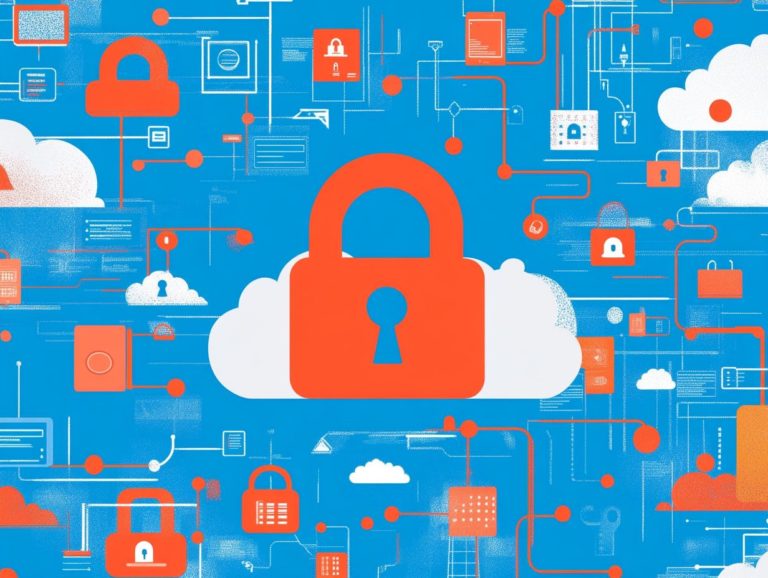Cloud Security Compliance: What You Need to Know
In today s digital landscape, cloud security compliance stands as a critical pillar for safeguarding your sensitive data and ensuring customer trust.
As your organization increasingly leans on cloud services, grasping key terms and concepts becomes essential. This article delves into the significance of compliance, the potential risks of overlooking it, and the common standards that guide organizations like yours.
You ll discover practical steps and strategies for achieving and maintaining compliance. We will address common challenges you might face and explore emerging trends in cloud security.
Whether you re an IT professional or just beginning your journey, this guide will equip you with the knowledge necessary to navigate the complexities of cloud security compliance with confidence.
Contents
Key Takeaways:

Cloud security compliance is crucial for protecting sensitive data. It requires understanding key terms, potential risks, and common standards. Achieving compliance involves implementing best practices to address challenges such as data breaches and regulatory requirements. Regular monitoring and updates are essential for maintaining compliance. For a deeper understanding, consider securing your cloud, as the future of cloud security compliance is constantly evolving, with new technologies and regulatory changes. Staying informed and adapting to these trends will be key.
Understanding Cloud Security Compliance
Knowing about cloud security compliance is crucial for your success! It involves navigating an array of regulatory standards and security measures designed to protect sensitive data and ensure operational integrity in cloud environments.
This approach covers compliance requirements such as the General Data Protection Regulation (GDPR), the Health Insurance Portability and Accountability Act (HIPAA), and various industry standards like NIST, ISO 27001, and PCI DSS.
These measures safeguard customer trust while maintaining data residency and protection against evolving threats.
Defining Key Terms and Concepts
Understanding key terms related to cloud security compliance is essential for navigating regulatory requirements and data protection measures. These concepts cover various aspects of information security, including cloud compliance, which ensures services adhere to guidelines for secure data handling.
Regulatory standards like GDPR and HIPAA set the framework for managing sensitive information, emphasizing the critical importance of data protection and user privacy. Security measures, such as encryption and access controls, are vital in safeguarding your data from unauthorized access and breaches.
For example, if you’re a healthcare provider storing patient records in the cloud, you must comply with HIPAA regulations, implementing protective measures to secure patient confidentiality and maintain trust.
Why Cloud Security Compliance is Important

Cloud security compliance is essential for your organization. It helps mitigate the risks tied to data breaches and cyber threats while ensuring adherence to regulations. Understanding IaaS compliance is crucial for meeting these compliance requirements set by regulatory bodies.
This commitment enhances customer trust and enables you to conduct thorough risk assessments. Additionally, you can implement effective incident response strategies to ensure that sensitive information is protected and operational integrity is maintained.
Stay informed about cloud security compliance to protect your business!
Potential Risks and Consequences
Failing to adhere to cloud compliance exposes you to a range of potential risks and consequences. These issues can jeopardize your data protection efforts and undermine the effectiveness of your security measures.
Non-compliance can lead to significant data breaches. Sensitive information may be compromised, resulting in hefty financial penalties from regulatory bodies.
This financial burden grows with the loss of customer trust and reputational damage. Rebuilding trust can take years.
To mitigate these risks, conducting regular risk assessments is crucial. This approach allows you to pinpoint weaknesses within your systems and update protocols accordingly.
Adopting a proactive approach to compliance safeguards your assets. It also ensures strong protection against ever-evolving threats.
Common Compliance Standards for Cloud Security
Several prominent compliance standards oversee cloud security. Each standard has its own regulations and requirements crafted to bolster data protection and security across diverse industries.
Among these frameworks are the:
- General Data Protection Regulation (GDPR)
- Health Insurance Portability and Accountability Act (HIPAA)
- National Institute of Standards and Technology (NIST)
- International Organization for Standardization (ISO 27001)
- Payment Card Industry Data Security Standard (PCI DSS)
Together, they promote best practices in cloud compliance. This ensures your data remains safeguarded and secure.
Overview of Major Standards

The key standards shaping cloud security compliance include GDPR, HIPAA, NIST, ISO 27001, and PCI DSS. Each framework has a unique approach to data protection and security measures.
Grasping these frameworks is essential. They come with specific requirements tailored to various industries and types of data.
For instance, GDPR emphasizes data privacy within the European Union. It requires rigorous consent protocols and transparency in data usage.
HIPAA is critical for healthcare organizations. It outlines stringent measures to safeguard sensitive patient information.
NIST offers a comprehensive risk management framework. This framework boosts security and cultivates a culture of compliance within your organization.
Meanwhile, ISO 27001 sets international standards for information security management systems. It ensures a systematic approach to handling sensitive data.
Finally, PCI DSS focuses on protecting payment card information. This makes it essential for businesses involved in financial transactions.
Adhering to these standards boosts your security and slashes risks in cloud environments. Don’t wait take action now to protect your data!
Steps to Achieving Cloud Security Compliance
Achieving cloud security compliance requires a systematic approach. This includes integrating best practices and implementation strategies tailored precisely to your organization’s unique needs, as detailed in cloud security and data backup.
This involves continuous monitoring and effective vendor management. Ensure that all compliance requirements are met.
By doing so, you not only fulfill necessary obligations but also cultivate a culture of security and accountability throughout your organization.
Best Practices and Implementation Strategies
Best practices and implementation strategies for cloud compliance revolve around continuous monitoring of security measures. Effective vendor management is also vital, ensuring that you adhere to all regulatory requirements.
Integrating advanced analytics and threat detection systems helps you proactively identify weaknesses before they escalate into significant issues.
Regular risk assessments allow you to pinpoint areas that need immediate attention. This enhances your overall security posture.
Establishing a culture of compliance within your organization is also key. Educating employees about data protection protocols bolsters a resilient cloud environment.
These measures protect sensitive information and foster trust with clients and stakeholders. Ultimately, they reinforce your organization s reputation in the market.
Challenges and Solutions for Maintaining Compliance

Navigating the world of cloud security compliance can be quite challenging, with its intricate rules you need to follow, ever-evolving security threats, and the need for effective vendor management. Understanding how to maintain cloud compliance is crucial in this landscape.
Act now to find innovative solutions that ensure your ongoing adherence to these complexities. Focus on developing comprehensive plans to quickly handle security incidents and proactive strategies to mitigate risks.
By doing so, you not only protect sensitive data but also enhance customer trust in your organization.
Addressing Common Obstacles
Addressing common obstacles to cloud compliance requires a thorough understanding of the challenges at hand and implementing effective solutions using a structured response framework.
Many organizations struggle with evolving regulations, inconsistent data privacy practices, and a general lack of awareness among their teams. These issues can lead to hefty fines, data breaches, and eroded trust with clients.
You must adopt a proactive approach, ensuring that every employee is well-trained in compliance protocols and best practices. A robust incident response plan tailored to your specific environment is essential.
This enables you to act swiftly when compliance issues arise, helping to mitigate risks while maintaining the highest data security standards.
Future of Cloud Security Compliance
Get ready! The future of cloud security compliance is transforming rapidly, propelled by emerging trends and insights that are redefining the landscape of data protection and security measures.
As you and your organization embrace cloud environments, compliance frameworks will adapt to tackle new risks and regulatory demands, all while prioritizing the trust of your customers.
Trends and Predictions for Compliance in the Cloud
Current trends in cloud compliance reveal a mounting emphasis on automation and continuous monitoring. There is also an increased focus on data protection measures to align with ever-evolving regulatory standards. This shift underscores a growing realization that static compliance checks simply won’t cut it in a landscape marked by rapid change and increasing complexity.
You ll find that technologies like artificial intelligence and machine learning can significantly enhance your capacity to stay one step ahead of compliance requirements. By harnessing these innovations, you can not only make your work easier but also gain valuable insights into your risk profile. This allows you to automate responses to potential breaches.
Expect compliance frameworks to evolve further, incorporating real-time analytics and adaptive governance models. This will empower your organization to tackle challenges head-on in the regulatory landscape of the cloud.
Frequently Asked Questions
What is cloud security compliance?
Cloud security compliance refers to the measures and protocols that ensure the security of data and information stored in cloud computing environments. It involves understanding cloud storage compliance regulations and meeting the regulatory standards and guidelines set by various organizations to protect sensitive data from unauthorized access, data breaches, and other security risks.
Why is cloud security compliance important?
Cloud security compliance is crucial for protecting your sensitive data. It helps organizations maintain the confidentiality, integrity, and availability of their data and information in the cloud. Understanding the relationship between cloud security and compliance also ensures that organizations adhere to legal and regulatory requirements, avoid penalties and fines, and maintain the trust of their customers.
What are some common cloud security compliance standards?
Some common cloud security compliance standards include ISO 27001, HIPAA, GDPR, and PCI DSS. ISO 27001 sets out the requirements for an information security management system, while HIPAA and GDPR focus on protecting healthcare and personal data, respectively. PCI DSS ensures the security of credit card information.
How can I ensure compliance with cloud security standards?
You can ensure compliance with cloud security standards by conducting regular risk assessments, implementing appropriate security controls, and regularly monitoring and auditing your cloud environment. It is also important to stay updated with changes in regulations and standards and to have a strong incident response plan in place.
Can I outsource cloud security compliance?
Yes, you can outsource cloud security compliance to a third-party provider. However, it is essential to carefully select a reputable and experienced provider who can meet your specific compliance needs. Clearly defining roles and responsibilities and regularly communicating and monitoring the compliance efforts of your provider is crucial.
Are there any challenges to achieving cloud security compliance?
Yes, there can be challenges to achieving cloud security compliance, such as keeping up with constantly evolving regulations and dealing with complex, multi-layered cloud infrastructures. Ensuring consistent compliance across different cloud providers is another challenge. Regularly reviewing and updating your compliance strategies and processes is important to address these issues.
Start your compliance journey today!






